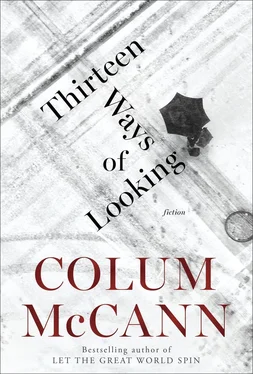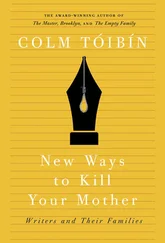In the hands of the detectives, the past never stops happening. They dive backward, with their spiral notepads, into the early verses of their work.
At the sight of blackbirds
Flying in a green light,
Even the bawds of euphony
Would cry out sharply.
One is too little, two is never enough. Another glass of Sancerre, please, my dear, then cut me off. Alexander the Great knew when and where to stop. It used to be, long ago long ago, that he could put away five, six glasses, but those days are gone, and his army has long since retreated.
In his early years there was the curious practice of the three-martini lunch. The Queen on Court Street. Luger’s on Broadway. Marco Polo’s in Carroll Gardens. But it was Gage and Tollner on Fulton Street that was the best of them all. Sunlight through the window. Motes of dust in the slanted shaftways. The gimlet hour. A spot of lime and soda, please. How in the world did the system operate when so much of the world was liquored up and tongue-loosened? You never quite knew what way the afternoon would swing. But he saw some great performances in his courtroom back in the day, lawyers who could spin out the most elegant of phrases when gin-lit. Standing up in the courtroom in slightly rumpled suits and ties, slurring, too, but still able to sling the sentences against sentence. Dan Barry, the best of them all. And Dwyer. And Cohen. And Dowd. All lawyer’s lawyers. They were sharpest in the morning. Their arguments could cut through steel. Come noon the world would grow fidgety. It was said that the worst time to finish a case was late in the afternoon when the judges were irritable and ready to go home. It was even worse earlier in the week, when they weren’t yet draped in the promise of a weekend’s respite. But for him, the energy would pick up with the assurance of escape from the gun barrels, the knifeblades, the razors, the meat cleavers, the endless parade of nightsticks and broken bottles. All that misery. It was as if, all of a sudden, the day had church bells in it, ringing again around four thirty as he sat in chambers, poring over evidence, or writing a judgment, or signing off on the endless paperwork which was, in itself, another form of mindless violence. Wake up, wake up, your day’s almost done. No more rapists. No more conmen. No more arsonists. No more shoplifters. No more stalkers. No more illiterate cops. It was like his own little get-out-of-jail-free card. The sun was going down, but the light was coming up. He never hung around for the evenings’ tomfoolery when the rest of them disappeared into the watering holes of Brooklyn, P. J. Hanley’s, the Inn, Buzzy’s place down by the waterfront. He caught a bit of shrapnel from within the party apparatus for moving to the Upper East Side, but he didn’t mind so much, it wasn’t incumbent on him to live in Brooklyn. He was off home to Eileen, driving across the bridge, no subway for him. The reverse commute. A lovely thing to see the sun fully disappear, a fine red aspirin swallowed by the city. He parked the car in the garage off Park Avenue. She would be waiting for him, in the kitchen, in her apron, dusting off her hands before she kissed him. He poured a stiff Scotch and headed straight for the deep leather armchair. How odd to live two such separate lives. He dozed off in the chair and woke to Eileen boiling up a cup of warm milk, his nightly mugshot.
Every now and then, Thanksgiving, Passover, Christmas, he’d stay out with the bigwigs in Brooklyn for a late night, or they’d drift their way to Manhattan, to the Lion’s Head, or McSorley’s, many of them Irish and paying the price for it. They thought of him as their Hibernian Jew: his accent still had a faint hint of the Dublin days and of course there was Eileen, reading aloud to him, putting what she called the rozziner in his language. The Irish war songs were merry, their love songs sad. They’d be there, in the courtrooms, the very next morning, after breakfast in Teresa’s on Montague, a little red around the eyelids, Janus-faced, but fully operational all the same. Keenan, Rhodes, Potter, McDonald, Jewell. Characters, all and sundry. Destined for heaven or hell, they didn’t really care that much. They were out and about, extracting life from life. What matter if half their clientele ended up on probation, or even worse, in jail? They had done their jobs. They had argued well. It was whiskey now, the water of life. Pour or be poured.
And how is it that the deep past is littered with the characters, while the present is so housebroken and flat? Wasn’t it Faulkner who said that the past is not dead, it’s not even past? Funny thing, the present tense. Technically it cannot exist at all. Once we’re aware of it, it’s gone, no longer present. We dwell, then, in the constant past, even when we’re dreaming of the future. Surely that’s a theme of some Shakespearean sonnet or other, though I can hardly remember them, waves coming towards the shore, our hastening minutes, our secret toil.
Oh, the head is spinning. Too much wine. The grapes of wrath. One is too little, and two is never enough. Words, it seems, that young Elliot has taken to heart, out there in the bathroom, or the restroom, or the john, or the jacks, or the vanetsimer, or the pishen hole, or whatever they call it nowadays. Gone ten, fifteen minutes. Take a good look in der shpigl, young man, and tell me what it is you see. He always was a boy vain for the mirror, especially in his college days, glancing at himself sideways every chance he got, that long blond hair on him.
How quickly the bright child becomes the ruined man. One is too little, two is often enough.
It was always Katya to whom he gravitated anyway. Quite the girl. A handful in her early years. An Upper East Side Marxist. At thirteen she sheared her hair. Then, a year later, got herself a nose ring. Wore a Che Guevara T-shirt on the few occasions that they went to temple together. She forged his signature on several checks that were made out to the Black Panthers. It started out in twenty-dollar installments, but ended up with one thousand. He learned about it through an article in the New York Post. He was not amused. He was the butt of jokes left, right, and center. They took, in the judicial corridors, to calling him Malcolm X. For her sixteenth birthday she sent her own check for five hundred dollars, but by then the novelty had worn off and she took, instead, to dropping the family’s china out the rear window of the apartment. Out with the footed cups and saucer plates! Out with the coupe soup bowls! Out with the tiered serving tray! Out with the immaculate gravy boat! ¡Viva la revolución! Who needs butter plates anyway? Let’s see how the sterling silver bounces! Hark, the serving platters sing! The courtyard was like an echo chamber. She loved how finely it splintered: apparently the sign of good china was how minutely it broke. They lived on the sixth floor, so there was time enough to hear the Waterford whistle. Several of the downstairs neighbors opened their windows and shouted at her to stop, but secretly they were surely interested in the sailing symphony. Stop, please stop, Katya, stop. Okay, if you must, just one more demitasse, please, my dear.
She went through a few thousand dollars’ worth of china over the course of two nights. The best punishment was no punishment at all. He went and kissed her sleeping forehead. A judge didn’t judge, not his own daughter anyway. She was into her military industrial complex by then. Ranted and raved and roared. Said he was having an obvious love affair with Nixon. Made Calvin Coolidge look like a liberal. Was interested to know if he’d like to buy body bags for all the students in her classroom. A government garment, she said. No pockets in a shroud. Went out in the streets with a loudspeaker, all five foot two of her, screaming through the canyonlands. Occidental death, she called it. But they all turn around in the end, anyway. Or some of them do anyway. She went out west to Berkeley where they put some manners on her, much to his surprise. Oriental Studies. Did her thesis on Ptolemy the Second. The Book of Optics. Vision occurs in the brain rather than the eyes. And isn’t that the truth? Went on to the State Department then. Agitating for peace while the rest of them made war. The argument for war has an easy gravity, she told him, but the one for peace does not. A smart cookie, Katya, even if she went out there to Israel, the one place on earth where it was guaranteed not to happen, at least not in this lifetime. You might as well try to turn the wine back into water.
Читать дальше












